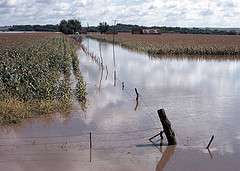Fruits and vegetables submerged by flood water are not safe to eat

Now that communities across the state have dried out and are repairing damages from Tropical Storm Lee, a gardening expert in Penn State's College of Agricultural Sciences reminds backyard gardeners that fruits and vegetables are not safe to consume if they have been partially or completely submerged in flood water or have come in contact with contaminated water.
Ginger Pryor, state coordinator for Penn State's Master Gardener Program, knows first-hand how attached growers can get to the plants that they've nurtured through the summer months from seeds or seedlings, only to see them covered by a nearby creek or stream. But there's a high risk of developing food-borne illness from consuming these products once the waters have receded.
"Flood water may be contaminated with sewage, animal waste, heavy metals, pathogenic microorganisms or other contaminants," Pryor said. "The contaminants are not only on the surface of the fruits and vegetables but may move into plant tissues.
Pryor explained that most produce cannot be cleaned sufficiently to consume, because bacteria can be taken up and contaminate internal plant tissues; even crops growing on stalks or vines above water levels can be tainted by splashing or infiltration.
"The U.S. Food and Drug Administration considers these products 'adulterated' and not fit for consumption," she said. "Such produce should not be used for home canning, freezing or drying. Produce from flood-damaged gardens also should not be sold at the farmers' market or farmstand."
Pryor said contamination risk will abate after 120 days, so any fruit-bearing perennial plants, shrubs or trees are safe after four months and need not be destroyed. And produce found in pooled or standing water after a rainfall that is not flooding should not be considered contaminated. But gardeners should be wary of future problems with flooded or soaked gardens.
"Where plants are in water-logged soil, they will wilt," Pryor said. "Phytopthora root and fruit rots, such as Buckeye rot of tomatoes, and Phytophthora on peppers, eggplants and all cucurbits can be a problem. Copper or Chlorothalonil fungicides are helpful in controlling the Phytophthora rots on tomatoes, peppers, eggplants and cucurbits. Applying a spray of one of the above will help to reduce the potential for rot.
"If your produce is in close proximity to a flooded area but has not come in contact with flood water, prevent cross contamination by cleaning your equipment -- including your shoes, tiller, hoe and other equipment -- with a solution of one part bleach to nine parts water."
Pryor said gardeners preparing an unplanted field or making soil that has been partially or completely flooded ready for replanting should treat the soil as if it has been treated with fresh manure: do not harvest or consume any produce grown in the field for 120 days.
After harvest, standard proper food handling methods in the kitchen are important for food safety. They include washing hands while preparing food; cleaning and disinfecting work surfaces, equipment and supplies; and using potable water.
"And, as always," said Pryor, "the rule of thumb for food safety is, 'when in doubt, throw it out.'"















